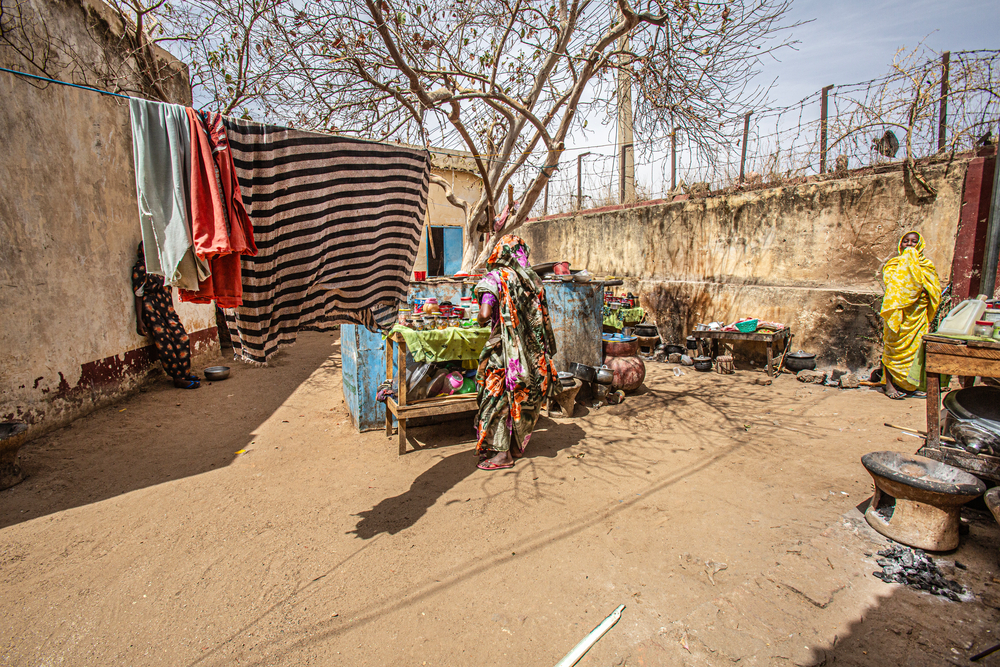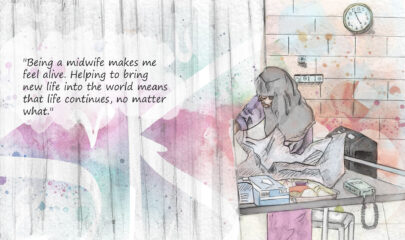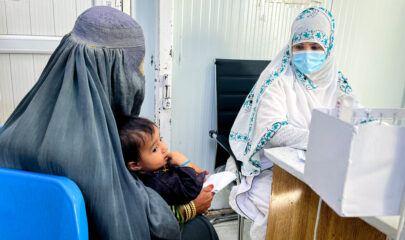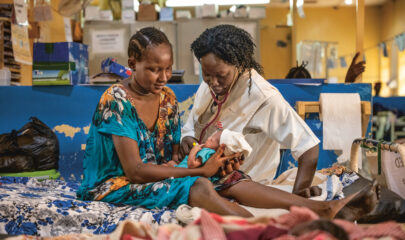Transcript of an audio testimony originally in Arabic. Moana* had been displaced three times, from Khartoum to Wad Madani to Haddad.
My name is Moana. I am from south Khartoum. I have eight children and I am 48 years old.
The conflict [in Sudan] started during Ramadan, after my husband passed away. He died just a month before Ramadan. When someone in your family dies, you grieve in isolation. I wanted to pass 54 days in isolation…I stayed all the time in my house. I stayed in the room so I didn’t have to meet or see anyone.
When shelling and shooting started in south Khartoum, I was forced to flee my house. I took my family with me.
We decided to leave at night and take a boat that would bring us from Khartoum to Wad Madani. My daughter’s husband had been arrested so I had to lead my family across such a dangerous route alone. We had nothing with us – no money, no food, no water. While we were crossing the waters, I could see the soldiers, the cars moving around and the sound of the shooting. We were really scared.
We stayed in Madani until one day in December, at 5 a.m., heavy airstrikes, shootings and killings started again.
I brought all my children to the streets. My cousin’s daughter was taken from the house…she’s 16. We don’t know where she is, whether she’s safe or not.
The only corridor out of Madani was at 10 a.m. We walked for five or six hours to reach Haddad. Again, no water, no food. My oldest son remained in Madani. I was afraid to take him with me. He’s still there. It’s much harder for men – if they stop you, you will be obliged to be recruited and fight.
I tried, I tried to go back and take my son. I am afraid to let him do the route alone. If I go back there, at least he can do the trip with me and I can put myself in front and negotiate his passage too. I don’t want to let him move alone.
Life now is different. Nothing happens here, it seems safe. But I know things can change rapidly. Living conditions are tough though…we live in the kitchen of the school, with other families. We have one bed only where I sleep because I am older. Others sleep on the school wooden benches.
I am sick, I have hypertension, and because of the conflict, I have not taken my medication for 10 months. Where would I get the money for it? I can’t afford it. I tried to collect some money, do some work here. The assistance we receive is not sufficient, I need to find a job. I’d like to cook some traditional food to make some money. I’m trying. Sometimes some organizations run distributions but it’s not enough and not regular. I have eight children. They are still students and I’ll need to cover the costs of their education.
If I think about what is happening, about what happened, I feel scared, unsafe. I want my family to be all together in the same place. Everything can still happen here. I cannot believe how everything has changed so quickly. It is important for people to know what is happening here, to know the facts, the reality, not the lies that are told in the news. This is the truth about Sudan.
*Name changed to protect identity.

ON APRIL 15, 2023, INTENSE FIGHTING BROKE OUT IN KHARTOUM AND ACROSS MUCH OF SUDAN WITH A WAVE OF GUNFIRE, SHELLING AND AIRSTRIKES.
The violence between the Sudanese Armed Forces and Rapid Support Forces has trapped millions of people in the middle of an unexpected conflict. Many have been forced to flee their homes while access to essential services such as healthcare has become increasingly difficult.
Doctors Without Borders/Médecins Sans Frontières (MSF) teams working in Sudan have been responding to the crisis since its first moments. Overworked Sudanese healthcare workers, many unpaid for months, strive to provide care amid immense challenges.
MSF teams’ ongoing work during this crisis has included offering:
- emergency surgery
- mobile clinics
- treatment for communicable, non-communicable diseases
- maternal, pediatric care
- mental health support
- care for survivors of sexual and gender-based violence
- water and sanitation services
- sexual, reproductive care
- donations of medicines, supplies to healthcare facilities
We also continue some of our medical activities in place before the start of the war.


